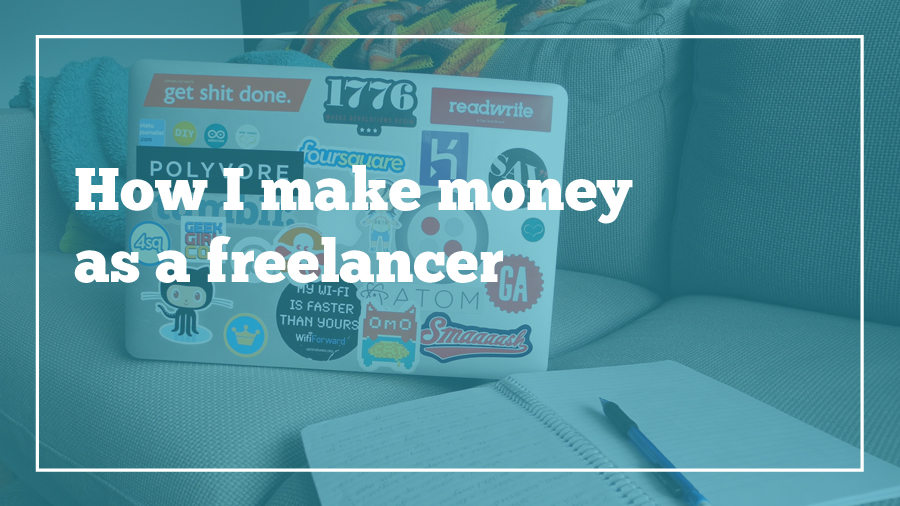In May, I parted ways with my biggest journalism client at the time, the one that was responsible for 75% of my income by itself. Since then, I’ve been a full time freelancer.
That was the last time I had a client that held me to specific hours, mainly 9 to 6 on weekdays. All summer, however, nobody has been accountable for my time but myself. I can write in the morning, code after midnight, and read a book in the park in the afternoon. I get how, when I’m tweeting at all hours, it might seem like I don’t actually have a job.
In my latest newsletter, I put out an exclusive poll to my readers about what they’d like to read about here. A few people asked how I earn a living, and this is a topic I LOVE to discuss because I think there are a lot of misconceptions. Let me tell you how I make money.
Breaking down my diversified income
After I left my client in May, I interviewed for some office jobs. Each time, I mentioned the many streams of income I have and each time, the interviewer asked if I’d be willing to give those up and focus exclusively on the job I was applying for. I always said no, which is probably why I never got the job. I can see why a company wants a loyal employee, but I have to look out for myself. If I got laid off, I’d be back at zero dollars a month.
I’ve read a lot of opinion pieces, like this one, that paint a freelance career as the opposite of financial security, as something people do only reluctantly. But for me, having a diversified income means that even if I lose one of my jobs, I’m not completely down and out. I’ll still be earning some money, which will make it easier to get back on my feet.
Currently, my monthly income comes from four places:
Gunpla 101. I build model robots and teach others to do the same. I’m an Amazon affiliate so when people click on links to Amazon and buy something, I make a small commission each time. This is slowly but surely growing to the point that I just hired a recurring guest columnist. I think it’s incredibly important to pay writers, so I waited until I could offer a competitive sum.
Amazon Kindle and Gumroad. I sell my books and workbooks at these two places. Amazon sells considerably better than Gumroad, since I’ve been there much longer and I don’t think a lot of people realize I’m on Gumroad yet. I sell my books ridiculously cheap for the amount of effort I put into them, so even when they sell well it’s really just in the low three figures a month. (By the way, sometimes I have traditional book deals, which usually pay up front and do not continue to earn money, the way my self-published books do.)
Anime News Network. Every season, I watch three shows and write three 500-word reviews. Reviewers are asked not to discuss how much money we earn there and I’m honoring that.
Forbes lets me work with one of my favorite editors, Helen Popkin, and write about my favorite topics. I am paid in clicks, which leads to some ConAir stories which do extremely well but don’t necessary “feed my soul,” if we want to get weird about it. I have written exactly five articles in August because i had a major web design project, but I’ll be back next month.
Web Design Clients. I make websites for the government, universities, businesses, and individuals. I don’t talk about this much, because it feels disingenuous that I write about being a full-time writer when I do other stuff as well. I know it’s possible to make my living freelance writing full time, because I’ve done it before and know many who still do. But the thing is, I really, really love designing websites. It makes me feel like a magician. I am in the process of becoming more open about this. You can also contact me if you’re interested in my services and you want a web designer that knows the difference between Love Live and your love life.
Living with fluctuating income
My diversified income is not always steady. A lot of these income streams are dependent on traffic. Gunpla 101 does better if i’m updating more. Kindle sales do better when I’ve just put out a book. Forbes does better when there’s no major news—on lighter news days, people like reading about and sharing about geeky stories more than when something intense is happening. Web design clients come and go, which makes sense: the idea is after I make a website for them, they don’t need me anymore!
This means my income can fluctuate from a whopping five figures in a month… to three figures the next month. I deal with this in a couple different ways:
Documentation. I keep intense spreadsheets to record my yearly earnings, monthly earnings, monthly expenses, taxes paid and owed, and other stuff like that. This also helps me remember to check in with clients who haven’t paid me yet. When you freelance, you become really good at talking about money (as this post clearly shows).
Emergency fund. Freelance work usually pays 30 days after I do it, and that’s when there aren’t issues with paperwork or the bank. That can mean I have money on its way soon, but the rent is due now. I keep an “emergency” savings account stocked with about $5k for the purpose of emptying out in the lean times, and replenishing in the good times. That way I don’t have to keep an uncomfortable amount of money in my checking account, but I also don’t have to withdraw from my actual savings when things get periodically tight.
Save where I can. When I first started freelancing, I looked at my bank statements to determine the bare minimum I could live on. I know the number I need to pay my bills and buy groceries, but that’s not really how I want to live. So I cut corners and live in a way that makes me feel rich. Traveling makes me feel wealthy. You may have noticed I go on vacation a lot. What you might not know is that I haven’t bought any clothing in years (except this sweet Omocat shirt). I also drive a ten-year-old car and have an occasionally inconvenient $20-a-month cell phone plan. I don’t have a washer-dryer or a thermostat in my ‘60s era apartment. (I could go on, but this isn’t the Frugal Olympics.) But hey, my Instagram makes it look like I’m living the life!

On being married and a freelancer
Unlike me, my husband, John, works a traditional 9-to-5 office job. I’m pretty sure a lot of people just assume John provides for me, or at least pays some of my bills. Not the case. We split everything 50-50, because yes, I make about as much as he does with my weird job.
I’m pretty good at acknowledging my financial privileges (thanks to two scholarships and two very generous parents, I don’t have student loan debt), but being married isn’t one of them. While I currently get my healthcare through John, if I were single, I’d still have lots of options. I’ve also paid out of pocket in the past—do people realize how cheap the dentist is this way? Being uninsured is no reason to skip your annual cleaning.
If there’s a perk to being a married freelancer, it’s the idea that if I’m really, really in trouble, I can ask John to help me out. The idea of doing that really bothers me, because it’s been important to keep my independence after getting married. So far that hasn’t happened, and during some months (due to my fluctuating income) I make more than he does!
Advice to future freelancers
Becoming completely self-employed is the best thing I’ve ever done for myself. Even when I’m busy I feel rich in time, because I plan my own schedule and prioritize what I think is important. I love working from wherever I want, whenever I want, and always making time to cook dinner in the evening, which is definitely my favorite chore.
It’s also one of the most challenging things I’ve ever done. I pay taxes four times a year (eight times if you count state taxes). I have to motivate myself and be entirely responsible for deadlines I can’t meet or promises I can’t deliver on. I have to constantly be selling myself.
If you think the perks are worth the challenges (as I certainly do), here’s my advice to you:
- I’ve been on my own for three months, but my freelancing career really began six years ago, when I received my first 1099-MISC for work I’d done on the side. What I mean is, don’t quit your day job just yet. Start picking up freelance work on the side first. When your day job is just 80 or 75 percent of your total monthly earning, you’re on the right track. When you are getting more freelance work offers than you have time to take on, that’s also a good sign you’re getting ready to make the jump.
- Get comfortable talking about money. You’re going to have a much closer relationship with it without a boss to insulate you. If you want to get paid, you can’t be afraid to figure out what your time is worth by the hour, and back it up with good work. You need to know how to send invoices and press clients who haven’t paid you.
- On that note, be honest with yourself and figure out not just what you CAN live on, but what you’re willing to live on. You only have a certain number of hours in a month, and if you calculate a rate that will let you work all of those and subsist on ramen noodles, you probably won’t be very happy. Think about the little luxuries that make your life worth living, and figure out how much you’d have to work to fit them in your budget.
This has been my longest blog post in recent memory. Still have questions? The comment section is below, my ask.fm is right here, and you’re always welcome to email me.
Discover more from Otaku Journalist
Subscribe to get the latest posts sent to your email.





7 Comments.
Thanks for the enlightening post! I admit I once considered doing freelance work full-time, but I didn’t think it was feasible for me at the time. So now I’m working a “normal” job and doing very minor freelance work on the side, which works great as well. But this was still a very helpful read, especially the part about healthcare, which I think I was most worried about when I considered working as a freelancer. :)
@disqus_yUiZtUBkPN:disqus and thank YOU for reading! I think that’s awesome that you balance freelance with the structure and benefits of a full time job. No matter what happens, you’ve got income coming in =)
[…] Last week, I wrote about the ways I make money as a niche freelancer. […]
Thank you for the write-up! Freelancing in a niche market is something I have been interested in for a while and it helps to see some of the details laid out. This also aligns well with other readings I have been doing about financial independence (a combination of creating passive income + reducing expenses). I looked up your writings by recommendation of a friend and I’m digging it! Definitely looking into your books and your future experiences in Japan!
This post was absolutely amazing! I’ve never read with so much detail someone else’s testimonial/struggles about being a freelancer. I was once one myself, but I got distracted and I went towards another direction. I’m trying to pursue that once again but more on the entrepreneur side. Keep the good work, Lauren =)
@dbandeir:disqus so glad you found it helpful!
[…] files from ten or more companies. And while my income is a lot more variable, we often end up bringing comparable amounts to the table. But while I work seven days a week for it, his workday almost always ends at 5 […]